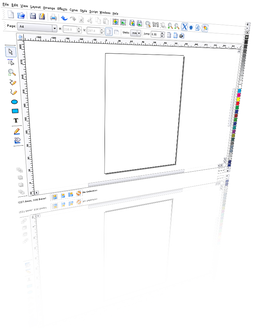http://sk1project.org/modules.php?na...ts&product=sk1
So this is for archival purposes only:
Igor, the icon king of Phatch, asked me if I could get sk1 to work on Ubuntu Gutsy. After playing around I found a way. Try this on your own risk.
I never heard about sk1 and looked it up on the website:
http://sk1project.org/
Why sk1project?It looks quite impressive and in five steps you can have it up and running on your Ubuntu Gutsy. It is a KDE application.
We think that sK1 is a powerful illustration program for the Linux platform that can substitute professional proprietary software like CorelDRAW or Adobe Illustrator and we hope the program and its derivatives will be helpful for you.
About sK1 vector graphics editor
sK1 is an open source vector graphics editor similar to CorelDRAW, Adobe Illustrator, or Freehand.
First of all sK1 is oriented for PostScript processing.
The major sK1 features:
* CMYK colorspace support
* CMYK support in Postscript
* Cairo-based engine
* Color managment
* Universal CDR importer (7-X3 versions)
* Modern Ttk based (former Tile widgets) user interface
1) Installing required modules
Type this at a terminal:
sudo apt-get install liblcms-utils python-liblcms python-imaging-tk kdebase-bin2) Installing tcl/tk8.5
Download the tk8.5 and tcl8.5 packages of Gustavo A. Díaz for the amsn project:
http://download.tuxfamily.org/amsnskins/packages/ubuntu/tcl-tk/
Open and install these files in this order with gdebi:
tcl8.5_8.5.0-2_i386.deb
tk8.5_8.5.0-2_i386.deb
3) Installing sk1
Now download the latest version of sk1 from:
http://sk1project.org/modules.php?name=Products&product=sk1
And convert it to a debian installer:
sudo alien sK1-0.9.0-rev324-0.mdv2008.i586.rpm4) Patching sk1
We need to patch this file:
sudo gedit /usr/lib/python2.5/site-packages/sk1/app/managers/colormanager.py
Replace there on line 9:
from lcms import (...)into
from lcms.lcms import (...)5) Start sk1
Press Alt+F2 and type "sk1" at the terminal and sk1 is up and running! You can create a menu entry with alacarta or a desktop launcher with the command "sk1". I have not tested how well it works.
This is a screenshot, turned into perspective with Phatch:

That's all right, but sK1 is not KDE application:
ReplyDeletehttp://sk1project.org/modules.php?name=Products
Excuse me, I don't know where I can report this, but in the page http://www.sk1project.org/modules.php?name=Products&product=sk1 the link to tk8.5_8.5.0-3_i386.deb is wrong (here in the blog it's Ok).
ReplyDeleteCheers.
Thank you for reported problem. The link missprint have fixed :)
ReplyDeleteGreat application (even on kde)!
ReplyDeleteFor the copy-paste people among us: While it's not explicitly stated, after converting the .rpm to .deb, you might want to actually install it.
You can combine converting and installing by replacing
sudo alien [....]
with
sudo alien -i [....]
Hi Igor,
ReplyDeleteI thought too that sK1 is not a KDE application, but when I installed it without kdebase-bin it complained that kdialog was not installed when I wanted to open a file.
Is that solved with the version you posted on the site?
Stani
that is solved even in your installed version :) Unfortunately, there is no GUI dialog for preferences (this will be fixed soon), but you can change open/save dialog type in app/config/configurator.py file. Just find a line which contains "kdialog, zenity" words. For alternative DE application can uses modified Tk dialog.
ReplyDeletethat is solved even in your installed version :) Unfortunately, there is no GUI dialog for preferences (this will be fixed soon), but you can change open/save dialog type in app/config/configurator.py file. Just find a line which contains "kdialog, zenity" words. For alternative DE application can uses modified Tk dialog.
ReplyDeleteGood to know. In that case you could try to find out if zenity or kdialog are installed on the system and call the one which exists as a default option. (eg. 'which zenity' will return the path to zenity)
ReplyDelete:) Of course such feature has been implemented. Here is lines from configurator.py (from sK1 for Ubuntu):
ReplyDelete#0- autodetect; 1- kdialog(KDE); 2- zenity(Gnome); 3 - Tk (modified);
dialog_type=2
If you set "autodetect" value, sK1 will detect DE type, check kdialog/zenity present and select dialog type.
This comment has been removed by the author.
ReplyDeleteEarlier I had posted a question about python not finding module sk1. I solved that problem by compiling everything from source.
ReplyDeleteNow upon starting sk1, I receive the message:
Cann't find Python binding for LittleCMS!
I've reinstalled python-liblcms, to no avail. Is there a work-around?
I followed the Instructions But it doesn't launch.... Please advice
ReplyDeleteHow to install on Hardy 64bit?
ReplyDelete